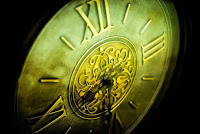It was still dark when Mary went to the tomb. She has no idea that the world through which she moves is a very different place that morning. It is the first morning after the resurrection, but no one knows what has happened. The world slept right through it.
Mary goes to the tomb in darkness. Maybe it was less painful that way. Perhaps the shadows numb her disappointment. Maybe she is embarrassed that she still cares about the body of Jesus after all that happened on Friday.
Mary moves in a world of shadows, and shadows have a way of disguising
the truth. They distort what is before
our eyes. Mary can still see among the shadows, but she sees wrongly.
The darkness distorts Mary’s vision. She gets it all so
wrong.
Mary sees so wrongly it is almost funny. She finds the tomb is empty. This is the best news ever. Jesus is not there; he is alive. But Mary assumes the worst news, that someone has taken his body, adding insult to injury.
Even when Mary sees the angels, she still believes the worst has happened. Mary still believes that Jesus can be taken from her, that she can be separated from the love of God.
The Apostle Paul writes in Romans 8:
35 Who shall separate us from the love of Christ? Shall trouble or hardship or persecution or famine or nakedness or danger or sword?...38 For I am convinced that neither death nor life, neither angels nor demons, neither the present nor the future, nor any powers, 39 neither height nor depth, nor anything else in all creation, will be able to separate us from the love of God that is in Christ Jesus our Lord.
Mary does not yet know what Paul knows. She believes things in this world can separate us from the love and grace of God. She believes we can find ourselves alone and lost in the world.
When she turns from the angels, Jesus himself stands before her. She does not recognize him because she is not looking for a living presence of God. She tells her sad story again about the body being taken and asks if Jesus knows where it is.
She is still looking for a dead body among the shadows. She sees through eyes of defeat and despair. So, she mourns in the presence of the living Lord.
She still believes this world is a place where all human caring and love are finally meaningless. The death of Jesus has convinced her that life goes nowhere. In the end it has no lasting meaning. The death of Jesus meant to Mary that the most sacred things of life can be taken from her by cruelty and hate.
Sometimes we can feel cruelty, hate, greed, racism, and fear of others can threaten all we hold dear. When we find wealth and power being used to injure and impoverish others and serve selfish ambition, we wonder if those things in which we have so long believed can survive the onslaught.
We wonder how long Mary’s obliviousness will go on. We want to shout at her, but Mary cannot hear us. It is like shouting at the TV that the villain is in the basement, don’t go down the steps; but they never listen to us.
Mary finally recognizes Jesus when he speaks her name, “Mary.”
In John chapter 10, Jesus says “the Good Shepherd calls his sheep by name. They know his voice and follow him because they know his voice.” Jesus is the Good Shepherd, and Mary recognizes his voice when he calls her by name. In that moment the darkness is overcome; the shadows melt away. No one can separate us from the Good Shepherd who loves us and cares for us. Mary now knows that.
Morning dawns on Mary. The light of what has happened floods her soul. She knows the power of God’s love is again loose in the world.
What was true for Mary is also true for us. The same light that flooded back into Mary’s life also floods our lives every day. The shadows and lies that mislead us are driven back. We now know anew: loved dashed to the ground always rises again; goodness when attached and wounded always emerges stronger; and God always has the last word in creation.
In chapter one of the Gospel John told us “The light shines in the darkness, and the darkness cannot overcome the light.” Nothing on this earth or in the heavens above can separate us from the love and grace of God…Nothing.
The Jesus who called Mary by name knows our names and says to us: “You are mine; all is never lost. The night is not forever.” He calls us from the shadows of discouragement into the light of faith. His spirit washes over us with hope. He warms our hearts with forgiveness. He opens our eyes to joy.
The resurrection of Jesus means the light of God’s love is winning against all the darkness. Jesus meets us in the shadows of this world and invites us into the light and warmth of God’s love. So hope lives in us.
Jim Kelsey—Executive
Minister of American Baptist Churches of New York State
Easter 2025



